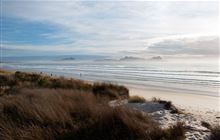Northland reserve bylaws
Published:
August 2008, updated December 2016Download the publication
View the Northland Reserves Bylaws 2007 on the New Zealand Legislation website.
The bylaws are in place to help us manage some of our most popular reserves more effectively.
This helps to make sure that everyone who uses them and lives near them can continue to enjoy them.
What are bylaws?
These particular bylaws have been developed through the Reserves Act 1977. They apply only to reserves administered by the Department of Conservation, and only to the reserves named listed under the Reserves in the Bay of Islands Maritime and Historic Park.
Bylaws are simply a tool to help protect natural, historic and recreational values. They describe and regulate the kinds of activities and behaviour which damage those values and affect other people’s enjoyment of particular areas or facilities.
What do they cover?
There is a standard set of bylaws which allows DOC to intervene when certain activities are undertaken. Examples of those activities are:
- Disorderly/offensive behaviour (e.g. excessive alcohol, using foul language)
- Camping without authorisation
- Graffiti and vandalism
- Bringing animals onto the reserves
- Inappropriate vehicle use including bicycles (except where the bylaw allows that vehicle use)
- Noise which disturbs others’ enjoyment (e.g. loud parties or radios)
- Lighting fires without a permit
- Other damaging activities such as bringing dangerous weapons, throwing objects, wasting water, littering, large and uncontrolled meetings and gatherings and posting notices.
How will the bylaws affect me?
The bylaws only affect you if you’re doing the activities listed on or in the specific reserves - or if you see someone else doing them. Record and report what you see as soon as possible to your nearest DOC office or by calling 0800 DOC HOT.
The bylaws mean DOC staff can warn people, ask them to leave, confiscate alcohol and where necessary, fine people who breach them up to $5,000
So can I still have a wedding or a work do on those reserves?
You need to contact the local DOC office first. Staff will let you know whether you need a permit.
What about having a couple of beers at a picnic?
The bylaws won’t affect you if you’re not disturbing other people and interfering with their enjoyment and your behaviour is not disorderly.
Can I ride my bike or drive my car around?
Only on formed roads and designated parking areas and camp grounds, or where signs show where you can or cannot drive or ride in the reserve.
What about having sports games where things are thrown around?
Provided that’s part of the game (e.g. a frisbee or ball) that’s fine. The key considerations are whether your activity damages or interferes with the natural, historic or recreational values of the reserve or you’re interfering with others’ enjoyment of it.
How were the bylaws developed?
Public input was widely sought from known and likely reserve users and communities. Meetings were also held with the NZ Police and district councils. Overall the feedback received was very positive and most of the comments people made have been covered in the final bylaws.
Which reserves are covered?
Whangarei area
At the moment the bylaws apply to the following reserves in Whangarei:
- Uretiti Recreation Reserve
- Motutara Recreation Reserve
- Oakura Beach Domain Recreation Reserve
- Otamure Recreation Reserve
- Bream Head Scenic Reserve
- Manaia Ridge Scenic Reserve
- Motukauri Scenic Reserve
- Purua Scenic Reserve
- Riponui Scenic Reserve
- Mangawhai Government Purpose Wildlife Refuge Reserve
- Bream Tail Scenic Reserve
- Waipu Government Purpose Wildlife Refuge Reserve
- Mimiwhangata Scenic Reserve
- Uretiti Scenic Reserve (view map - PDF, 1,002K)
- Ocean Beach Recreation Reserve (view map - PDF, 1,002K)
- Bream Islands Scenic Reserve (view map - PDF, 1,002K)
- Motukiore Island (view map - PDF, 1,002K)
- Poupouwhenua Scenic Reserve (view map - PDF, 1,002K)
- Ruakaka Scenic Reserve (view map - PDF, 1,002K)
Kaitaia area
Reserves in the Kaitaia area:
The Department of Conservation is working towards enacting bylaws for various other reserves in the Whangarei, Kaitaia, Bay of Islands and Kauri Coast areas.
Bay of islands area
Similar bylaws (Hauraki Gulf Maritime Park bylaws) currently exist for a range of mostly coastal reserves in the Bay of Islands.
Publication information
Published by Department of Conservation, Northland

